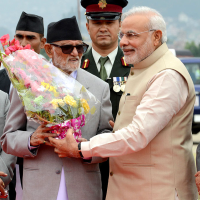With ‘Act East’ India Begins to Push Back Against China
 Nepal PM Koirala (left) greets Modi in Kathmandu last year (file photo)
Nepal PM Koirala (left) greets Modi in Kathmandu last year (file photo)
There has been an imperceptible shift in India’s approach to dealing with China's recent expansion into South Asia. For years, Delhi seemed unable to decide whether it should protest, obstruct or simply ignore Beijing’s overtures to India’s neighbours. Often it would tie itself into knots while China quietly worked out deals with countries like Sri Lanka, Bangladesh and Nepal. But not any longer.
Under Prime Minister Narendra Modi, India has pushed back against China in the region with a new robust diplomacy, which Modi calls "Act East". The biggest diplomatic victory for India so far has been the unexpected defeat of Sri Lankan President Mahinda Rajapaksa in an election this month.
According to a report by Reuters, India played a key role in organising the opposition against pro-China Rajapaksa. His successor, President Maithripala Sirisena, has said India is the "first, main concern" of his foreign policy and that he will review all projects awarded to Chinese firms, including a sea reclamation development in Colombo that would give Beijing a strategic toehold on India's doorstep.
Critics of Rajapaksa accuse him of war crimes, corruption and nepotism. But until last year India was indecisive, perhaps afraid of pushing the hero of the war against Tamil separatists even closer to China.
That changed last September, when Rajapaksa allowed a Chinese submarine to dock in Colombo, without informing India, as it was bound to under an existing agreement.
"That was the last straw," a senior Indian diplomat told Reuters.
"He told Modi: "the next time I will keep you informed,"" the diplomat said, a promise that was broken when the submarine visited again in November.
In the build up to the January 8 election, India played a role in uniting Sri Lanka's usually fractious opposition, for which the station chief of India's spy agency was expelled, diplomatic and political sources say.
Modi is repairing fences across South Asia. He has already visited Nepal twice, becoming the first Indian prime minister to travel to the Himalayan buffer state with China in 17 years, and signing long delayed power projects.
India is also contesting a port project in Bangladesh that could otherwise have been a cakewalk for China. The Adani Group, a large corporate from Modi's home state Gujarat, submitting a proposal in October for the $8 billion deep water port project that Bangladesh wants to develop in the Bay of Bengal. Early bidder China Harbour Engineering Company was previously the front-runner.
"Modi is willing to engage on long-term issues that stretch beyond India's border, including maritime security in the South China Sea, as well as North Korea and Islamic State militants in Iraq and Syria," said Richard Rossow at CSIS, a policy think tank.
"That's when we start to think about India as a regional global provider - or as a global provider of security," he noted.
Modi has improved ties with Japan and Vietnam, both involved in territorial disputes with China. This has reportedly met with approval in Washington, which has been nudging India for years to pull its weight in Asia.
"What is appealing to me and my colleagues is the fact that Prime Minister Modi has undertaken to build from what has been a 'Look East' policy to an 'Act East' policy," U.S. Assistant Secretary of State for East Asia and the Pacific Daniel Russel said in Washington in December.
- Karan Singh
To Learn More:
As Obama visits, signs that India is pushing back against China (Reuters)
Insight: Indian spy's role alleged in Sri Lankan president's election defeat (by John Chalmers and Sanjeev Miglani, Reuters)
India won, China nil as Sri Lanka turfs out Rajapaksa (by Frank Jack Daniel, Sydney Morning Herald
Bangladesh wants India to lead South Asia to emerge as a global player (bdnews24)
- Top Stories
- Controversies
- Where is the Money Going?
- India and the World
- Appointments and Resignations
- Unusual News
- Latest News
- India College Chain’s Expansion into U.S. Draws Opposition from Massachusetts Officials over Quality of Education
- Milk Shortages in India Tied to Release of New Movies Featuring Nation’s Favorite Stars
- Confusion Swirls around Kashmir Newspaper Ban in Wake of Violent Street Protests
- Polio-Free for 5 Years, India Launches Vaccine Drive after Polio Strain Discovery
- New Aviation Policy Could Increase Service, Lower Ticket Prices






Comments